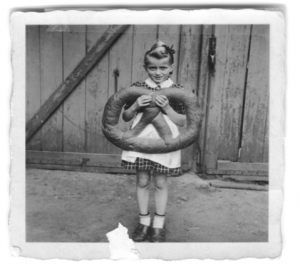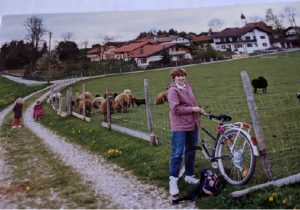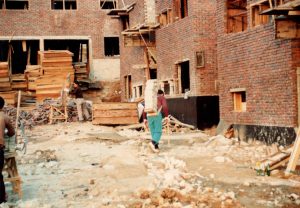After my six-hour flight from the modern upscale Frankfurt airport I stepped into the kingdom of Bahrain – a world of white-robed men wearing matching headscarves (ghutrahs) fastened with halo-like black cords (agals). They looked like angels to me. A magical midnight scene, a great start for my new adventure. It was summer and I would teach at the U.S. – seventh fleet, navy base in Manama. The average temperature hovered around 50 degree Celsius = 120 Fahrenheit. HOT! Naps during high noon soon became routine.
Directives in a letter from the U.S. embassy had prepared me. American women in Bahrain were to dress modestly. Hemlines at mid-calf, high necklines, avoidance of cleavage and modest sleeves to hide naked shoulders were the rule. There was a warning to avoid an upcoming Shia festival where flagellation with swords often became bloody displays.
When leaving Frankfurt, I sensed a pending new reality at the Gulf Airlines check-in. Powerless, I watched as airline employees inspected my luggage. My textbooks passed. Movie tapes were suspect! They had to go. I learned to adapt to legal and cultural mandates in Bahrain. Saudi Arabia a neighbor was less tolerant.
My one-bedroom apartment in Manama was in a secure U.S. military hotel. Attempts for bombing attacks were constant. To enter the hotel required three separate ID checks. It would be bombed again after I had left. A Pakistani security force was always on duty marching in the hallways – rifles ready for an attack.
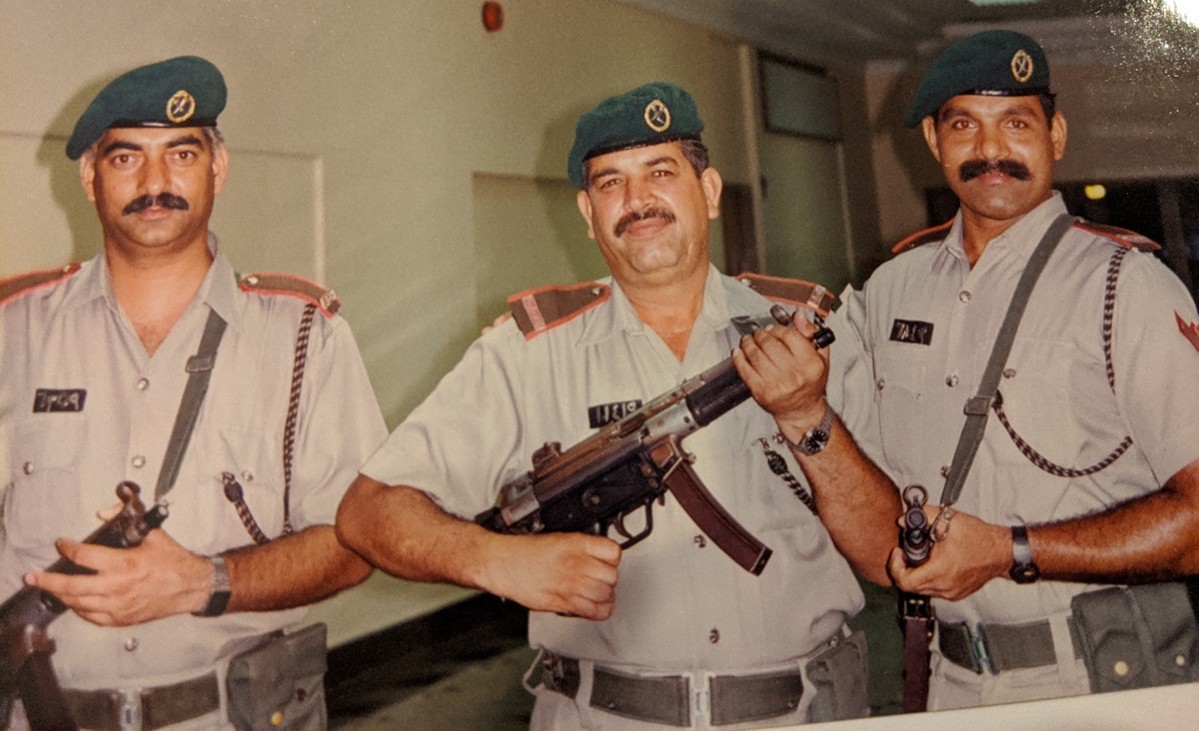
Three security guards that made me feel safe to live there.
My stay in the hotel was very pleasant and included a part-time person who cleaned my room. I had access to the dining room, exercise facilities and a swimming pool cooled to 82 degrees. Once the pool cooling system broke making the water unpleasantly warm. We enjoyed the pool when it was cool and heard the chanting from the nearby mosque.
The Grand Mosque, a block away, dominated the view from my window. Chants from loudspeakers permeated the air five times a day. The static from the prerecorded tapes made the sounds artificial. At night, the scene was a peaceful holy place from my room.
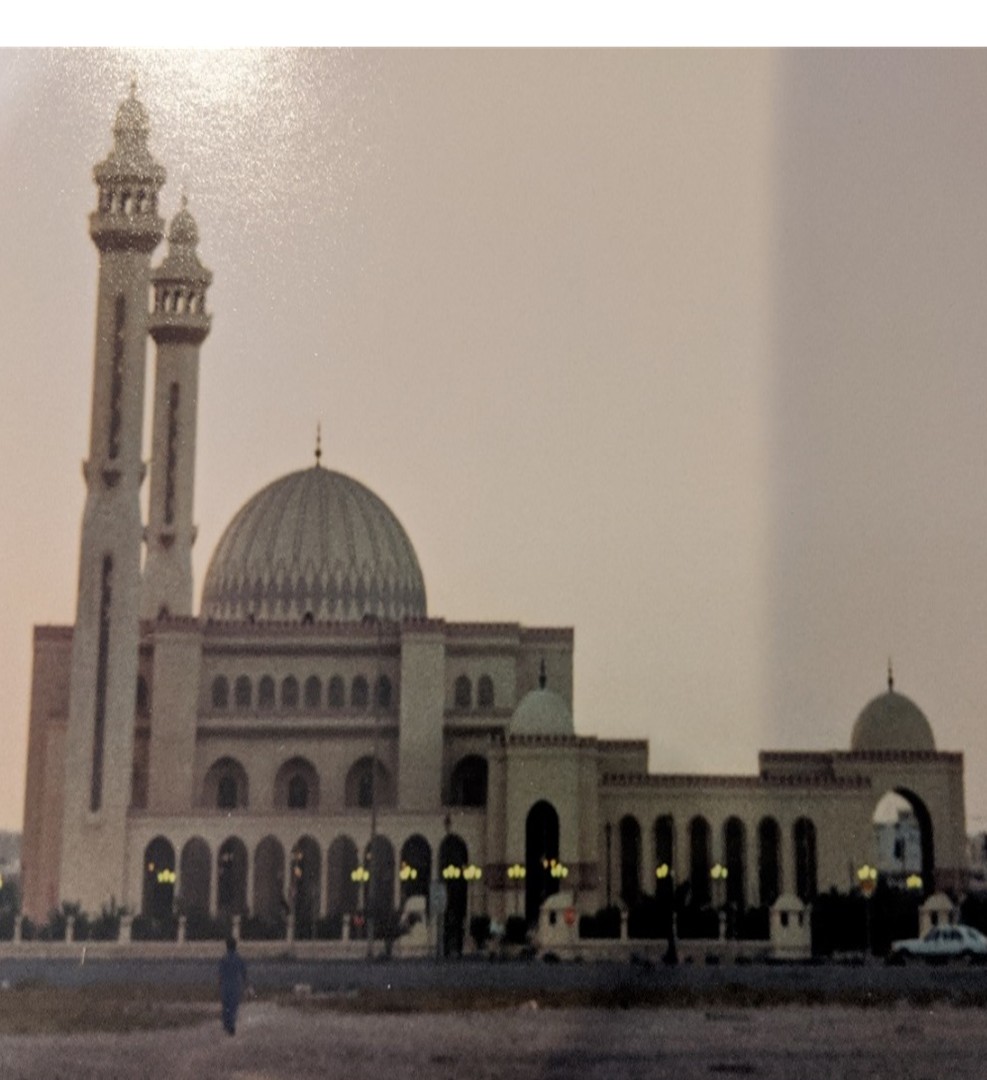
A picture of the Grand Mosque taken from my apartment hotel window
My classrooms at the American High School were two miles away. My feet were my transportation. Late afternoon walks to class were treats of discovery each time. I passed small shopping areas, women wearing black abayas, men in white thobes and modest neighborhoods with mud and stone houses. A memorable treat was to get a freshly pressed mango drink at a small kiosk. Heavenly! Men in groups sat in shady alcoves playing board games. I was greeted with friendly hand waving when I walked by. Feeling welcomed and accepted I had my picture taken with them.
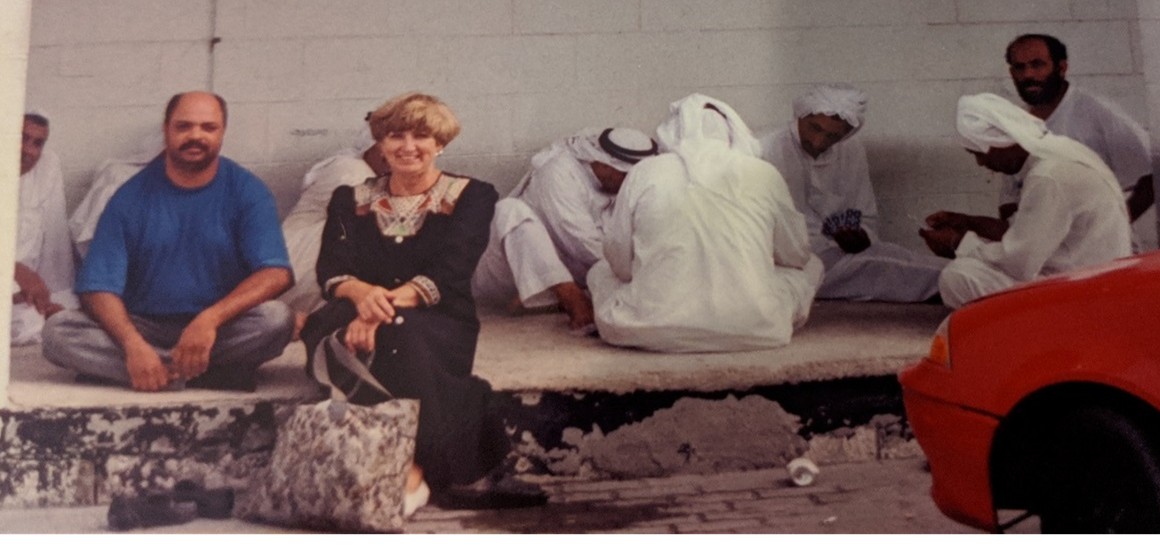
A picture with local citizens taken on my walk to class.
Rows of empty school busses sat idle each time I arrived at the high school. It was serious bomb inspection time. Security professionals scanned each bus carefully with their bomb inspection tools before the high school students could board. It was a daily ritual. I soon accepted this as a norm.
Surrounded by date palms heavy in fruit, my students and I waited patiently to enter the high school classrooms. My students, both male and female, were a demographic mix of U.S. military personnel, their dependents, local Bahrainis and Saudi citizens. The Saudi students travelled up the narrow causeway from Saudi Arabia going through inspections at the border each time. Some complained that Saudi border guards would inspect their textbooks and rip out any material they deemed offensive. They were a mix of the Shia and Sunni religious traditions. Male Muslim students arrived, modestly hugging a prayer rug to their bodies. They would disappear halfway through class to go to a private place for evening prayers.
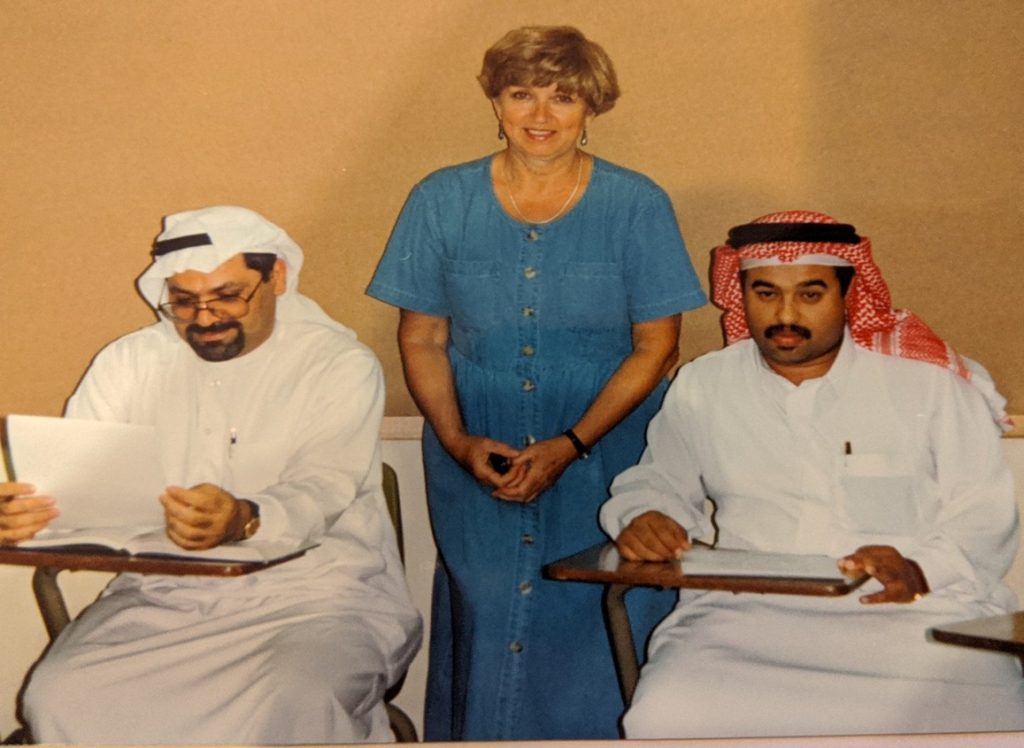
Teaching in Bahrain was a rewarding experience. All students wanted to learn and applied themselves asking for help when needed. I established some friendships and took part in festivities. At a home of a student, a father proudly pointed to a tree in their yard. A tree is a symbol of wealth since it costs an average of $400 per year to water it.
I taught a number of business courses and a history course on western civilization. I encouraged students to explore how to get help at the U.S. embassy’s commercial division on how to trade with the U.S. As always, I visited the local museum and the larger area by taking small tours to visit a famous tree site where the Epic of Gilgamesh describes the geography of the region. A trip by a replica of a wooden sailing ship took me to an island in the Arabian Gulf. Much to my surprise the Persian Gulf is renamed the Arabian Gulf by the Arab countries along this major waterway that separates Iran from numerous Arab countries across from it.
There was much construction around my area. I watched the construction of an apartment complex next to my hotel. Most of the crew came from nearby Muslim countries as temporary workers. Some seemed to live on the construction site. It bothered me to watch.
These guest workers had little freedom. Many also worked as servants, nannies, and chauffeurs. Their employers took their passports away while they worked there. They had little freedom of movement.
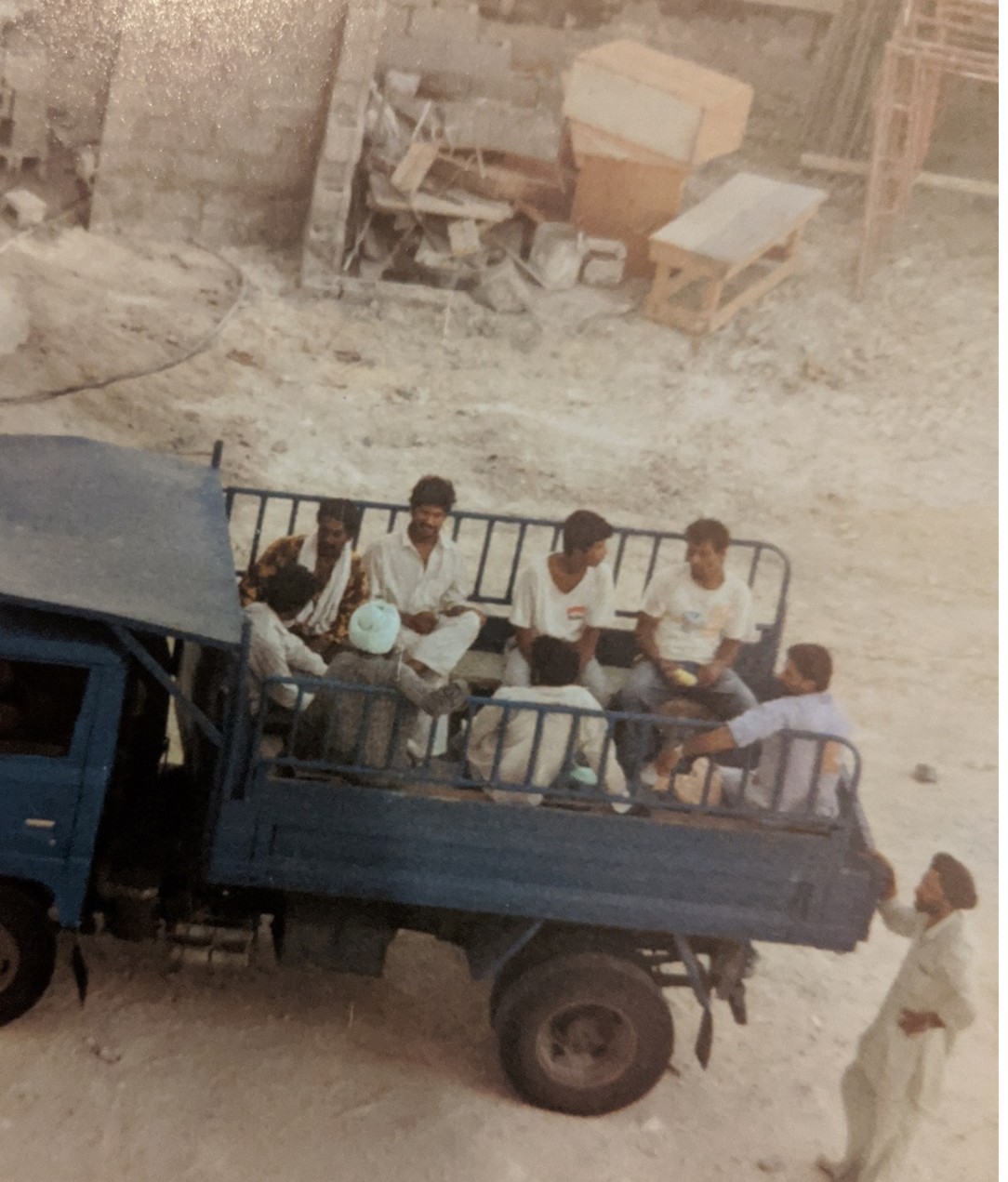
I learned much about the local habits and culture. Many locals dressed in the western dress but there were many differences. Some women wore the traditional abya in public. One native student told me she would dress in a western outfit but preferred to go to the sook – the local market place in a traditional abaya. Underneath she could wear whatever she wanted and often wore skimpy shorts hidden from the public. She considered the abaya as mostly convenience.
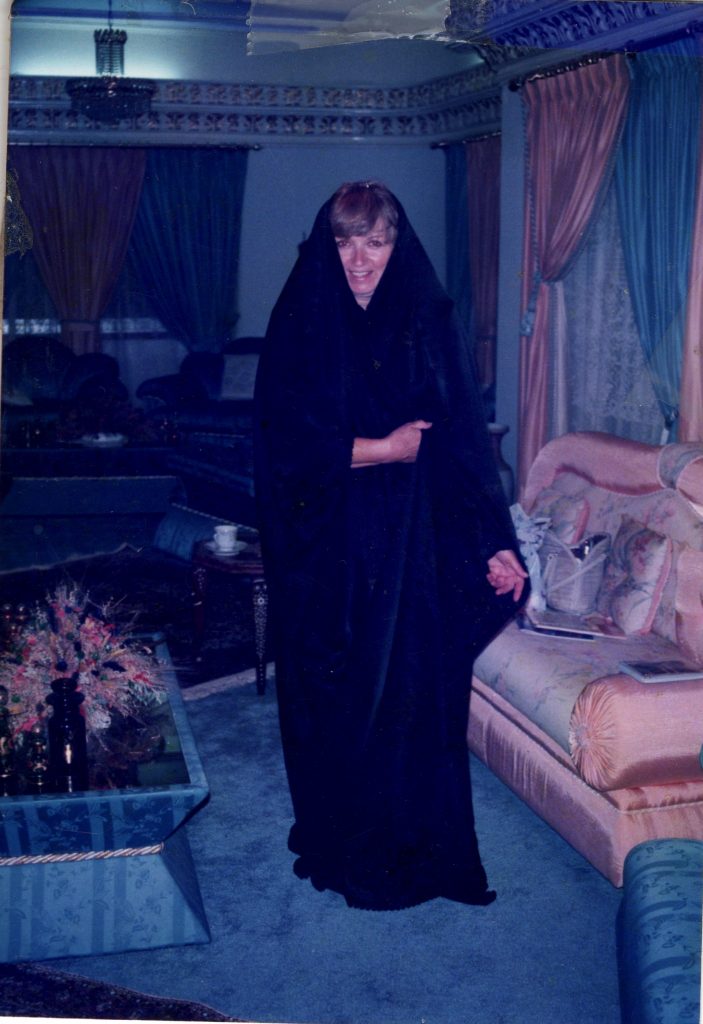
A lesson learned when visiting a local family was not to cross my legs so that the soles of my shoes pointed at my host. My host visibly shuddered indicating this was a major insult. I remembered, and quickly uncrossed my legs and put feet on the floor.
One night, my students kindly offered to drop me off my hotel after class. It was then dark and after nine p.m. I appreciated this very much and sat in the back of the car on the way. When I got out, I thanked them very much and tried to shake their hands in appreciation. This was a scary thing for them to touch another female. They quickly said they were married and could not shake my hand. Slightly embarrassed I thanked them again. Another lesson learned.
From time-to-time, I took the hotel shuttle bus to go to the sook, the local outdoor market, to shop and look around. It was an amazing place with many vendors and lively interactions. The spice markets were my favorite. Spices are artistically arranged on tables in colorful mounds. Then, are individually packaged as customers desire and sold by weight. Clothing of all kinds hung invitingly in clothing stalls. Frequently, a male sat in front with a sewing machine ready to customize items to my preferred taste. I could not resist and bought some lovely caftans that I still wear at home.
I left with many good memories of Bahrain. Conditioned to dress conservatively I flew back to Frankfurt with a bulging suitcase of souvenirs. Back on land at the Frankfurt airport I had a major culture shock when I saw a woman in a long body tight sheath dress show both cleavage and a slit along the side that revealed her skin close to her buttocks. It seemed very shameful and provocative after my more modestly dressed views of women in Bahrain. To this day, I prefer modesty in dress.
